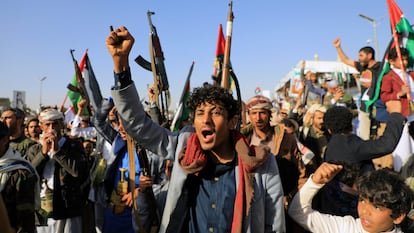Could it escalate? A look at what is behind Iran and Pakistan’s airstrikes
Launching these strikes allows Tehran to show strength without risking a wider confrontation with Israel and the U.S. Pakistan wanted to send a message to Iran and other neighbors

This week’s airstrikes between Iran and Pakistan that killed at least 11 people mark a significant escalation in fraught relations between the neighbors.
Long-running, low-level insurgencies on either side of the border have frustrated both countries, and the apparent targets of the strikes — Iran’s on Tuesday and Pakistan’s response on Thursday — were insurgent groups whose goal is an independent Baluchistan for ethnic Baluch areas in Iran, Pakistan and Afghanistan.
The question is why Iran and Pakistan would choose to strike insurgents in each other’s territories rather than their own, considering the risk of a wider conflagration.
The background
Iran and Pakistan share a 900-kilometre (560-mile), largely lawless border where smugglers and militants roam freely. Both countries have suspected each other of supporting, or at least behaving leniently toward some of the groups operating on the other side of the border.
Jaish al-Adl, the Sunni separatist group that Iran targeted on Tuesday, is believed to operate out of Pakistan, launching attacks on Iranian security forces. The Baluch Liberation Army, which was formed in 2000 and has launched attacks against Pakistani security forces and Chinese infrastructure projects, is suspected of hiding out in Iran.
Why did Pakistan retaliate?
Pakistan said its strikes in Iran on Thursday were aimed at hideouts of the Baluchistan Liberation Army and the Baluchistan Liberation Front. It also wanted to send a message to Iran and other neighbors that it can fight back if provoked.
The last time Pakistan retaliated against a neighboring country was in 2019, when it downed two Indian warplanes and captured a pilot in the disputed Kashmir region. It followed an Indian strike inside Pakistan against what New Delhi said was a terrorist training camp.
Why now?
Iran and Pakistan have long had a volatile relationship, but these strikes are likely prompted by internal dynamics.
Tehran has been experiencing a growing pressure for some kind of action after a deadly Islamic State group attack earlier this month, Israel’s war on Iran’s ally, Hamas, and wider unrest against its theocracy. Pakistan’s attack on Thursday also served a domestic purpose, according to analysts.
“The government and military have been under immense pressure (since Tuesday),” said Abdullah Khan from the Pakistan Institute for Conflict and Security Studies think-tank in Islamabad. “The public perception of a strong army is not as it used to be, so it had to respond.”
Could the situation escalate?
Iran’s military on Thursday began a planned annual air defense drill stretching from its port of Chabahar near Pakistan in the east, all the way across the country to its border with Iraq in the west. The drill will include live fire from aircraft, drones and air defense systems.
Fresh strikes by Iran and Pakistan cannot be ruled out, although this week’s attacks raise questions about the preparedness of their own militaries, particularly their radar and air defense systems.
For Pakistan, such systems are crucial given its constant, low-level tensions with its nuclear-armed rival, India. Its equipment has long been deployed along that frontier, rather than its border with Iran. Separately, Iran relies on radar and air defense systems in the case of potential strikes by its main enemy, the United States.
What do the airstrikes mean?
Launching these strikes allows Tehran to point to it directly taking military action without risking a wider confrontation with either Israel or the U.S., particularly as tensions also remain high over Iran’s rapidly advancing nuclear program.
Pakistan’s strike may relieve domestic political pressure, but could backfire later, as the Baluch Liberation Army said it will avenge the killings and wage war on the state.
Sign up for our weekly newsletter to get more English-language news coverage from EL PAÍS USA Edition
Tu suscripción se está usando en otro dispositivo
¿Quieres añadir otro usuario a tu suscripción?
Si continúas leyendo en este dispositivo, no se podrá leer en el otro.
FlechaTu suscripción se está usando en otro dispositivo y solo puedes acceder a EL PAÍS desde un dispositivo a la vez.
Si quieres compartir tu cuenta, cambia tu suscripción a la modalidad Premium, así podrás añadir otro usuario. Cada uno accederá con su propia cuenta de email, lo que os permitirá personalizar vuestra experiencia en EL PAÍS.
¿Tienes una suscripción de empresa? Accede aquí para contratar más cuentas.
En el caso de no saber quién está usando tu cuenta, te recomendamos cambiar tu contraseña aquí.
Si decides continuar compartiendo tu cuenta, este mensaje se mostrará en tu dispositivo y en el de la otra persona que está usando tu cuenta de forma indefinida, afectando a tu experiencia de lectura. Puedes consultar aquí los términos y condiciones de la suscripción digital.








































